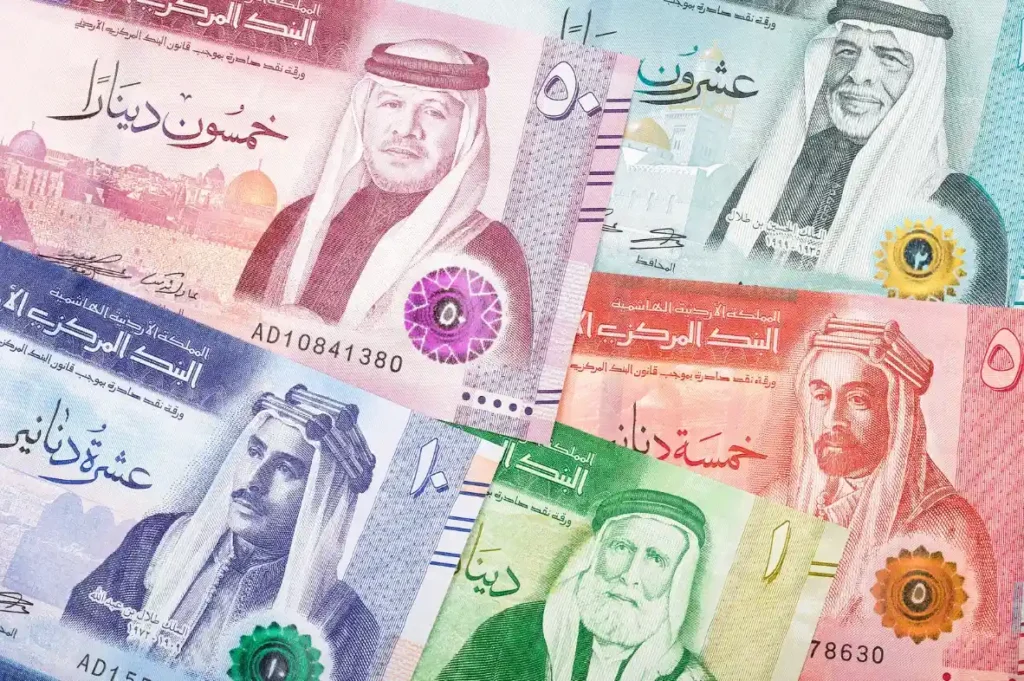Jordan’s ancient wonders, breathtaking desert landscapes, and vibrant cities make it an unforgettable travel experience, but knowing how to manage money is key to a smooth journey. Whether you’re exploring Petra, floating in the Dead Sea, or shopping in Amman’s bustling souks, this guide provides all the details – what currency to bring, the best ways to get money and currency in Jordan (Jordanian Dinar (JOD)), cash safety tips, and important dos and don’ts. With these insights, you’ll navigate Jordan’s payment systems with ease and avoid unnecessary fees.
How to pay in Jordan – cash or card?
In Jordan, both cash and card payments are widely utilized, with a noticeable shift towards digital transactions in recent years. While cash has historically been the dominant payment method, recent trends indicate a decline in cash usage and a rise in electronic payments.
You can use cash for:
Public Transportation: Buses and taxis often require cash payments, though some modern taxi services may accept cards or digital payments.
Local Markets and Street Vendors: Purchases at traditional souks and street stalls are predominantly cash-based.
Small Businesses: Many small or family-run shops and eateries prefer cash transactions.
Tips and Gratuities: It’s customary to tip in cash for services such as dining, tour guides, and hotel staff.
Entry Fees: Some museums, parks, and attractions may only accept cash for admission.
You can use card for:
Retail Stores: Major supermarkets, shopping malls, and branded stores widely accept debit and credit cards.
Restaurants and Cafés: Many dining establishments, especially in urban areas, facilitate card payments.
Hotels and Lodging: Most hotels, guesthouses, and lodges accept card payments.
Online Services: E-commerce platforms, online bookings for flights, accommodations, and other services typically require card payments.
Fuel Stations: While many accept cards, it’s advisable to confirm beforehand, as some may prefer cash.
What’s the best currency to take to Jordan
Jordanian Dinar (JOD) is typically the best currency to take if you are traveling to Jordan. Paying or withdrawing money in the local currency comes with the least amount of fees, sometimes fee-free too. Note that ATMs in Jordan dispense cash in the local currency, Jordanian Dinar (JOD), which is a closed currency and can only be exchanged within the country. So it’s best to withdraw cash after you arrive and convert any leftover JOD before leaving, as it’s hard to exchange abroad.
While some tour operators and hotels may quote rates in US Dollars, paying in foreign currencies can result in poor exchange rates. Therefore, it’s advisable to pay in JOD to avoid losing money.
Euros or Pounds are not widely accepted here.
Where to get currency in Jordan
There are 3 main ways to get cash in Jordan. They are:
ATMs, or
Currency exchange, or
Money transfer & local pick-up
Types of cards to swipe in Jordan
Establishments with POS machines readily accept Visa and Mastercards for swiping. You might also find some places that accept Amex and other cards, albeit less frequently.
Types of cards at ATMs in Jordan
If you’re withdrawing money in Jordan from an ATM, ATMs commonly accept Visa, Mastercard, Maestro, Plus, Cirrus cards. Some of them accept JCB, UnionPay, Diners or Discover cards.Others like Rupay cards are generally not accepted.
Should I exchange money before travelling to Jordan
Bringing a small amount of Jordanian Dinar (JOD) before traveling can be useful for immediate expenses like taxis, tips, or small purchases. However, exchange rates outside Jordan are often poor, and many foreign banks do not stock JOD.
Withdrawing JOD from ATMs in Jordan is a convenient option, as ATMs are widely available in airports, cities, and tourist areas. Most ATMs accept Visa, Mastercard, Cirrus, Plus, and Maestro cards, but check your bank’s international withdrawal fees.
It’s best to exchange currency in Jordan at banks or licensed exchange bureaus, which offer better rates than airports or hotels. If exchanging at the airport, do so only for a small amount to cover initial expenses.
Carrying a mix of cash and cards is advisable. If bringing USD, EUR, or GBP, they can be exchanged easily at banks and exchange bureaus for competitive rates. USD is sometimes accepted in tourist areas, but paying in JOD is recommended for better value.
Where to withdraw money in Jordan
You can withdraw money in Mozambique at leading bank ATMs in the country. The best ATMs for foreigners to use in Jordan are those owned by popular banks such as:
Cairo Amman,
Jordan Kuwait,
Arab Bank,
Bank of Jordan,
AJIB, and
Al Etihad.
There are other banks with ATMs that also accept international debit and credit cards.
There are no known Global ATM Alliance member banks or All Points network banks in Jordan.
Where to exchange currency in Jordan
Common places to exchange currency in Jordan are licenced exchange bureaus or banks.
Currency Exchange Offices: In Jordan, currency exchange offices are commonly referred to as صرافة (Sarafa). These are widely available in tourist areas, shopping centers, and airports. Notable providers include Musharbash Exchange, Alawneh Exchange, Abu Sheikha Exchange, Global Exchange.
Banks: Major banks such as Arab Jordan Investment Bank (AJIB) offer currency exchange services. AJIB has branches throughout cities, providing reliable services. Operating hours are typically from 9:00 AM to 3:30 PM on weekdays, with some branches open on Saturdays.
You can find good currency exchanges using the ATM Fee Saver app – it will guide you to the nearest currency exchange on the map. The app helps you with forex places in 100+ countries, including Jordan.
Avoid Airport Exchanges and no-fee exchange offices: Currency exchange services at airports often have less favorable rates and higher fees. It’s generally better to exchange money in the city for better rates and lower charges.
Is carrying cash safe in Jordan
Carrying money in Jordan is generally safe, as the country has low crime rates. However, petty crimes like pickpocketing and bag-snatching can occur, especially in areas frequented by tourists. It’s advisable to carry only the cash you need for the day and keep your valuables secure.
To keep your cash safe:
Carry only necessary amounts: Withdraw cash as needed to avoid carrying large sums.
Be discreet: Avoid displaying cash in public places.
Stay vigilant: Remain aware of your surroundings, particularly in crowded areas.
By following these precautions, you can minimize the risk of theft and handle cash safely during your travels in Jordan.
Is it better to use debit or credit cards or pay by cash in Jordan
Use a card if it is fee-free i.e. your bank does not charge any fees to swipe the card, when the merchant / POS also does not impose any extra charge to use a card, you need to use the insurance of the card, don’t want to block cash of large purchases and card’s swipe fees are lower than withdrawal fees.
Pay by cash by withdrawing cash from ATM or exchanging currency where – fees on ATM withdrawals are lesser than fees on swiping cards, you don’t want to leave any digital footprint of your expenses, it is convenient and easier to conduct transactions.











